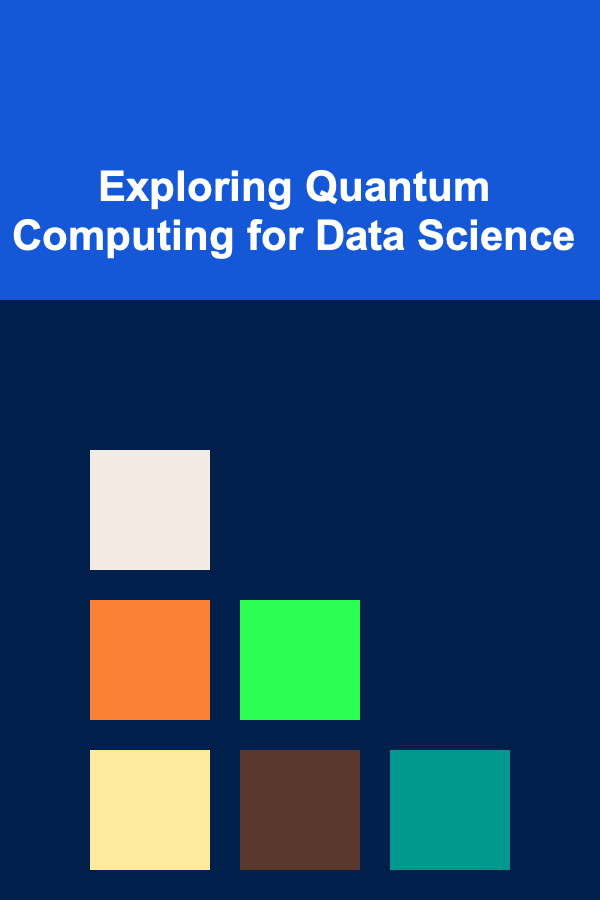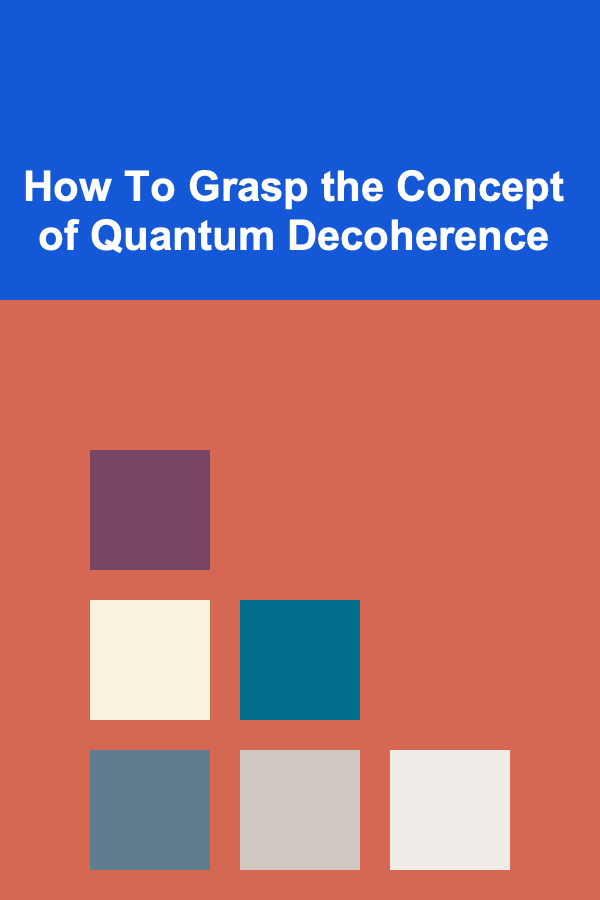
Exploring Quantum Computing for Data Science
ebook include PDF & Audio bundle (Micro Guide)
$12.99$9.99
Limited Time Offer! Order within the next:

The intersection of quantum computing and data science is rapidly emerging as a field with transformative potential. While still in its nascent stages, quantum computing promises to revolutionize how we process, analyze, and extract insights from data, offering the possibility of solving problems that are currently intractable for even the most powerful classical computers. This exploration delves into the fascinating world of quantum computing, its potential applications in data science, the current state of the technology, and how data scientists can begin their journey into this exciting new frontier.
Understanding the Fundamentals of Quantum Computing
To appreciate the potential of quantum computing, it's crucial to grasp its fundamental principles, which differ significantly from classical computing. Classical computers store and process information using bits, which represent either a 0 or a 1. Quantum computers, on the other hand, leverage the principles of quantum mechanics to store and process information using qubits.
- Superposition: A qubit can exist in a superposition, meaning it can represent 0, 1, or any combination of both simultaneously. This is analogous to a coin spinning in the air before it lands, representing both heads and tails at the same time. This allows quantum computers to explore a vast number of possibilities concurrently.
- Entanglement: Entanglement is a unique quantum phenomenon where two or more qubits become linked, and their fates are intertwined regardless of the distance separating them. Measuring the state of one entangled qubit instantly determines the state of the others. This allows for powerful correlations and parallel computations.
- Quantum Gates: Similar to logic gates in classical computers (AND, OR, NOT), quantum computers use quantum gates to manipulate the state of qubits. However, quantum gates are based on unitary transformations and can perform operations on qubits in superposition and entanglement.
These quantum properties enable quantum computers to perform certain calculations much faster than classical computers. The most well-known example is Shor's algorithm, which can factor large numbers exponentially faster than the best-known classical algorithms. This has significant implications for cryptography.
Potential Applications of Quantum Computing in Data Science
The unique capabilities of quantum computers open up a wide range of possibilities for transforming data science across various domains. Here are some key areas where quantum computing could have a significant impact:
1. Quantum Machine Learning
Quantum machine learning (QML) aims to develop quantum algorithms that can enhance or accelerate machine learning tasks. This includes both developing entirely new quantum machine learning algorithms and adapting existing classical machine learning algorithms for quantum computers.
- Quantum Support Vector Machines (QSVMs): QSVMs leverage quantum algorithms to efficiently perform the kernel calculations used in classical SVMs. This can potentially lead to significant speedups in classification tasks, especially with high-dimensional data.
- Quantum Principal Component Analysis (QPCA): QPCA offers a quantum approach to dimensionality reduction, potentially enabling faster and more efficient feature extraction from complex datasets. This is crucial for datasets where classical PCA struggles due to computational limitations.
- Quantum Neural Networks (QNNs): QNNs are a family of machine learning models inspired by the architecture of classical neural networks, but implemented using quantum circuits. They have the potential to learn complex patterns and relationships in data that are difficult for classical neural networks to capture.
- Quantum Generative Adversarial Networks (QGANs): QGANs, analogous to classical GANs, use quantum circuits to generate new data samples that resemble the training data. This can be useful for data augmentation, anomaly detection, and generative modeling.
While the development of QML is still in its early stages, research is rapidly progressing, and promising results have been demonstrated in various areas such as image recognition, drug discovery, and financial modeling.
2. Optimization Problems
Many data science problems involve optimization, where the goal is to find the best solution from a vast set of possibilities. Quantum computers are well-suited for tackling certain types of optimization problems that are computationally challenging for classical computers.
- Quantum Annealing: Quantum annealing is a quantum algorithm designed specifically for solving optimization problems. It works by finding the minimum energy state of a quantum system, which corresponds to the optimal solution to the problem. D-Wave Systems is a company that has developed quantum annealers. Quantum annealing is particularly effective for solving combinatorial optimization problems, such as the traveling salesman problem and portfolio optimization.
- Variational Quantum Eigensolver (VQE): VQE is a hybrid quantum-classical algorithm used to find the ground state energy of a quantum system. It can be applied to a wide range of optimization problems, including those arising in materials science, chemistry, and finance. VQE is particularly useful when dealing with complex energy landscapes.
Applications in data science include:
- Portfolio Optimization: Finding the optimal allocation of assets to maximize returns while minimizing risk.
- Supply Chain Optimization: Optimizing the flow of goods and services from suppliers to customers to minimize costs and maximize efficiency.
- Route Optimization: Finding the most efficient routes for vehicles or delivery services.
3. Quantum Simulation for Data Generation
Quantum simulation involves using quantum computers to simulate the behavior of quantum systems. This can be used to generate synthetic data that accurately reflects the properties of real-world systems, which can be particularly valuable in situations where obtaining real data is difficult or expensive.
For example, in drug discovery, quantum simulation can be used to simulate the interactions between drug molecules and target proteins, allowing researchers to identify promising drug candidates more efficiently. In materials science, quantum simulation can be used to predict the properties of new materials, accelerating the discovery of materials with desired characteristics.
4. Cryptography and Data Security
While quantum computers pose a threat to existing cryptographic algorithms, they also offer the potential for developing new, quantum-resistant cryptographic techniques. This is crucial for protecting sensitive data in a world where quantum computers become more powerful.
- Quantum Key Distribution (QKD): QKD uses the principles of quantum mechanics to securely distribute encryption keys between two parties. Any attempt to eavesdrop on the key exchange will inevitably disturb the quantum state of the qubits, alerting the legitimate parties to the presence of an eavesdropper.
- Post-Quantum Cryptography (PQC): PQC refers to cryptographic algorithms that are believed to be secure against both classical and quantum computers. Researchers are actively developing and standardizing PQC algorithms to replace existing algorithms that are vulnerable to quantum attacks.
Data scientists need to be aware of the potential impact of quantum computing on data security and actively participate in the development and implementation of quantum-resistant cryptographic solutions.
5. Quantum Databases
Quantum databases are theoretical databases that leverage quantum principles to potentially offer advantages over classical databases in certain scenarios. While still largely conceptual, they hold promise for specific data-intensive applications.
- Quantum Search Algorithms (Grover's Algorithm): Grover's algorithm provides a quadratic speedup over classical search algorithms for unstructured databases. While not an exponential speedup like Shor's algorithm, it can still significantly reduce the time required to find specific items in large databases.
- Quantum Data Structures: Researchers are exploring quantum analogs of classical data structures such as linked lists and trees. These quantum data structures could potentially enable more efficient data storage and retrieval in specific applications.
The practical implementation of quantum databases faces significant challenges, but ongoing research is exploring their potential for applications such as fraud detection, personalized medicine, and scientific data analysis.
The Current State of Quantum Computing
Quantum computing is currently in a state of rapid development. While significant progress has been made, there are still considerable challenges to overcome before quantum computers can be widely used for practical applications. Here's a look at the current landscape:
- Hardware Limitations: Building and maintaining stable and scalable qubits is a major engineering challenge. Current quantum computers have a limited number of qubits, and these qubits are often prone to errors. Different qubit technologies are being explored, including superconducting qubits, trapped ions, and photonic qubits, each with its own advantages and disadvantages. Error correction is also a crucial area of research, as it is essential for building fault-tolerant quantum computers.
- Software and Algorithms: Developing quantum algorithms and software tools is another significant challenge. Quantum programming requires a different mindset and skill set than classical programming. New programming languages and software libraries are being developed to facilitate the development of quantum applications.
- Accessibility: Access to quantum computers is still limited and often expensive. However, cloud-based quantum computing platforms are becoming increasingly available, allowing researchers and developers to experiment with quantum computers remotely. Companies like IBM, Google, and Microsoft offer cloud access to their quantum computing hardware.
Despite these challenges, the field is advancing rapidly, and many experts believe that quantum computers will eventually become a powerful tool for solving a wide range of problems that are currently intractable for classical computers. The "quantum advantage" -- the point at which quantum computers can demonstrably outperform classical computers on specific tasks -- is a key milestone that researchers are actively striving to achieve.
Getting Started with Quantum Computing for Data Science
For data scientists interested in exploring the potential of quantum computing, there are several steps they can take to get started:
1. Build a Foundation in Quantum Mechanics and Linear Algebra
A basic understanding of quantum mechanics and linear algebra is essential for comprehending the principles behind quantum computing. This includes concepts such as:
- Complex Numbers: Quantum mechanics relies heavily on complex numbers.
- Linear Algebra: Vectors, matrices, and linear transformations are fundamental to representing and manipulating qubits and quantum gates.
- Quantum States: Understanding how to represent the state of a qubit and how it evolves under quantum operations.
- Quantum Operators: Learning about the different types of quantum operators and how they act on quantum states.
Online courses, textbooks, and university-level courses are excellent resources for learning these concepts. MIT OpenCourseware and Coursera offer several relevant courses.
2. Learn Quantum Programming
Several quantum programming languages and frameworks are available for developing quantum algorithms and applications. Some of the most popular include:
- Qiskit (IBM): A Python-based open-source quantum computing framework that provides tools for designing, simulating, and executing quantum circuits.
- Cirq (Google): Another Python-based open-source framework for quantum computing that focuses on near-term quantum devices.
- PennyLane (Xanadu): A Python-based framework for quantum machine learning that allows you to train quantum circuits using classical machine learning techniques.
- Q# (Microsoft): A domain-specific programming language for quantum computing that is part of the Quantum Development Kit (QDK).
Start by working through tutorials and examples to familiarize yourself with the syntax and concepts of a chosen language. Experiment with simple quantum algorithms such as the Deutsch-Jozsa algorithm and Grover's algorithm.
3. Explore Quantum Machine Learning Libraries
Several libraries are emerging that focus specifically on quantum machine learning. These libraries provide pre-built quantum machine learning algorithms and tools for integrating quantum and classical machine learning techniques.
- PennyLane: As mentioned above, PennyLane is a powerful library for quantum machine learning.
- Qiskit Machine Learning: Qiskit also provides a dedicated module for quantum machine learning.
Experiment with these libraries to implement quantum machine learning algorithms for tasks such as classification, regression, and clustering. Compare the performance of quantum machine learning models to classical machine learning models on benchmark datasets.
4. Utilize Cloud-Based Quantum Computing Platforms
Access to quantum computing hardware is often limited and expensive. However, several cloud-based quantum computing platforms provide remote access to quantum computers.
- IBM Quantum Experience: Provides access to IBM's quantum computers through a cloud interface.
- Google AI Quantum Playground: Offers access to Google's quantum simulators and experimental quantum hardware.
- Amazon Braket: Provides access to quantum computers from different hardware providers, including D-Wave, IonQ, and Rigetti.
- Microsoft Azure Quantum: Offers access to a range of quantum computing hardware and software resources.
Use these platforms to run your quantum algorithms and experiments on real quantum hardware. This will allow you to gain practical experience and understand the challenges of working with current quantum devices.
5. Collaborate and Engage with the Quantum Computing Community
The quantum computing community is a vibrant and collaborative one. Engage with other researchers, developers, and enthusiasts to learn from their experiences and contribute to the field.
- Attend Conferences and Workshops: Attend conferences and workshops on quantum computing and quantum information science to learn about the latest research and developments.
- Join Online Forums and Communities: Join online forums and communities such as Stack Exchange, Reddit, and Slack to ask questions, share knowledge, and connect with other quantum computing enthusiasts.
- Contribute to Open-Source Projects: Contribute to open-source quantum computing projects to gain practical experience and make a meaningful contribution to the field.
- Read Research Papers: Stay up-to-date on the latest research by reading scientific papers published in journals such as Physical Review Letters, Nature, and Science.
6. Focus on Specific Data Science Problems
To make your exploration of quantum computing more focused and impactful, identify specific data science problems that you are interested in and investigate how quantum computing could potentially be applied to solve them. Consider problems where classical methods struggle due to computational complexity or data volume. Examples include:
- Drug Discovery: Using quantum simulation to model molecular interactions and accelerate the discovery of new drugs.
- Financial Modeling: Developing quantum algorithms for portfolio optimization, risk management, and fraud detection.
- Materials Science: Using quantum simulation to predict the properties of new materials and accelerate materials discovery.
- Image Recognition: Developing quantum machine learning models for image classification and object detection.
By focusing on specific problems, you can gain a deeper understanding of the potential of quantum computing and identify areas where it can have the greatest impact.
Conclusion
Quantum computing holds immense promise for revolutionizing data science. While the technology is still in its early stages, the potential for solving currently intractable problems is compelling. By understanding the fundamentals of quantum computing, exploring potential applications, and engaging with the quantum computing community, data scientists can position themselves at the forefront of this exciting new frontier. As quantum computers become more powerful and accessible, their impact on data science will only continue to grow, creating new opportunities for innovation and discovery.

How to Build a Team Building Activities Checklist for Small Teams
Read More
How to Increase the Value of Your Rental Property with Simple Upgrades
Read More
How To Master Self-Discipline Through Psychology
Read More
How To Grasp the Concept of Quantum Decoherence
Read More
How to Develop a Positive Relationship with Food
Read More
How to Nail the Research Phase: Interview To-Do List for Informed Candidates
Read MoreOther Products

How to Build a Team Building Activities Checklist for Small Teams
Read More
How to Increase the Value of Your Rental Property with Simple Upgrades
Read More
How To Master Self-Discipline Through Psychology
Read More
How To Grasp the Concept of Quantum Decoherence
Read More
How to Develop a Positive Relationship with Food
Read More